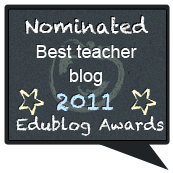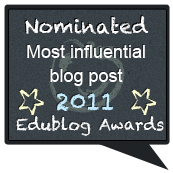In the summer of 2011, I was in a major blogging slump. I was writing very little and not writing very well. In the first six months of 2011, I published 32 posts. Then, in the final six months, I published 161.
That’s an increase of over 500 percent.
What happened from June to July that enabled me to increase my output?
I learned I didn’t have to wait for inspiration to come from my classroom.
I realized I could find inspiration in many places.
With this understanding, I was liberated from the thought that ideas had to come to me and empowered by the realization that I could find ideas if I was looking.
So, if one of your ambitions this year is to be a better blogger – to write more, write better, increase your reach – here are some ideas that have worked for me that will also work for you:
1. Write about what you read. Being a better blogger means being a reader of blogs. At this point, I spend more time reading Google Reader, Flipboard, and Zite than I do reading books. There are so many wonderful blogs out there (see my blogroll to the right for some of my favorites) and so, if you’re reading them, there is rarely a shortage of inspiration of thought. Sometimes I explicitly acknowledge the post that led me to write my own (like Vicki Davis’ here, Josh Stumpenhorst’s here, and Nick Provenzano’s here).
Much more frequently, though, a kernel of thought is planted in my head and it sprouts into my own post days or weeks later (like here).
The more ideas in your head, the more incentive you will have to write (lest you allow your head to explode).
2. Find inspiration where there appears to be none. Being a better blogger means engaging in an active process that shifts the burden of inspiration to you. You need to make inspiration happen.
Rather than let it come to you, go out and find it.
I became a better photographer when I started looking at the world asking, “How would this look in a photograph?” I became a better blogger when I started looking at the world asking, “How can this relate to education?”
I have found inspiration in unusual and unexpected places that I have been able to apply to education: my grandmother’s death, my cousin’s birth, Whitney Houston’s music, and natural disasters.
3. Blog (and micro-blog) on the run. Being a better blogger means always being aware of ideas that you could eventually turn into posts. Writers keep notebooks with inspiration so that they can draw upon those ideas when they need to write something. My system is a bit less, well, systematic, but it works for me.
I scribble ideas on post-its and throw them in my pockets. I e-mail myself ideas from my phone. Sometimes I start a one-sentence draft on my WordPress app and save it for elaboration at another time. Ideas often hit me when I’m driving to or from school in the quiet company of my thoughts, but they don’t do me much good if I forget them (and this has happened too many times to count).
4. Dig in your heels and take a stand. Being a better blogger means not worrying about offending people with an unpopular position. It means standing up to opposition, rocking the boat, and challenging people. It is all at once exciting, intimidating, and fun.
I have vigorously defended my beliefs about college and career as the expectation for all and have strongly disagreed with friends over the merit of awards. Most recently, I took on the oft-revered Khan Academy – drawing a lot of criticism – for its brazen one size fits all mentality. You can’t worry too much about upsetting people. After all, your blog must reflect you and your beliefs – not what you think people want to hear.
5. Dig up some stories from your past. Being a better blogger means reaching back for ideas. We spend time thinking about times from our past, so it only makes sense that we can and should spend time writing about times from our past, too. I have written about painful experiences in my childhood, fun times in college, and social missteps that changed my thinking. Our past experiences shaped who we are today. The past is a treasure trove of rich material for writing. Do not ignore it.
These are ideas to help you broaden your blogging. There is nothing wrong with writing about your class or school! I still write plenty about the goings-on in my classroom and with colleagues, but now I do so in the much greater context of life itself.
I hope these ideas help you become a better blogger!








